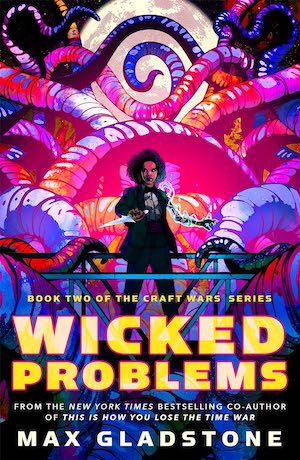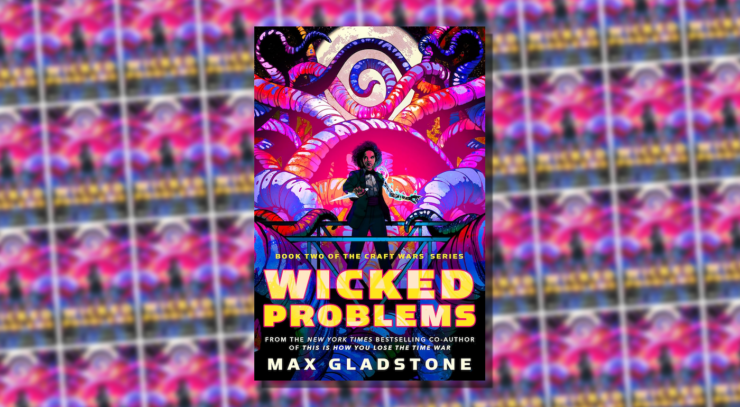The end of the world has been approaching for a while in Max Gladstone’s Craft series; it’s just taken a little while to get there. You see, the end of the world is taking its sweet time as it moseys in from the depths of space, ambling past constellations at its own pace. But needless to say, it is coming. As Wicked Problems begins, the second book in Max Gladstone’s Craft Wars series, the disparate agendas of various powerful factions begin to find fruition, and unfortunately, only a handful want to keep the world safe. And even those groups cannot agree on how best to do that. While Dead Country, the first book in the Craft Wars, was a very focused narrative lens for Tara Abernathy—a character study as much as it was an adventure of Craft and cunning—it is here in Wicked Problems that Gladstone lets his red conspiracy board string run wild, snarling and crisscrossing, as he brings dozens of connections, characters, bits of worldbuilding, and more to bear in this frenetic, kinetic, and wonderfully satisfying book.
At the end of Dead Country, two things happened: One, Tara Abernathy’s student and brilliant craftswoman, Dawn, merged with a force that was pure, refined Craft. The underlying truths of the universe, Craft is the name given to the magic that humanity has learned to wield, powerful enough to challenge the gods themselves. Resulting in the God Wars, the conflict has been over for some time, but not without the status quo crumbling time and again, as humanity must learn to run a world they took from the majority of gods. And in Dawn, she has merged with the most ironic form of Craft: a god born of the very nature of the practice itself, a god of magic itself.
And as she and this god of magic merged, so did their rage, resulting in them fleeing, injuring Tara in the process. And while Dawn and her newly-named being, Sybil, stay on the lam, keeping away from the eyes of Gods and craftsfolk alike, both of whom would wish to use and then destroy them, Tara needs to do the one thing she has hated doing all her life: ask for help. Because what Tara and Dawn both know is that the end of the world is walking toward them from the stars, and they wish to stop it. How they each wish to stop it… well, you’ll have to read and find out.
Buy the Book


Wicked Problems
Reading this book was so much goddamn fun, I’m still grinning thinking about it! If you’ve been a reader of Gladstone’s Craft Series from the beginning, Wicked Problems feels like he’s flung open the doors of every novel that has come before, and the resulting cocktail party finds disgraced holy men rubbing elbows with divine litigators, ex-chosen ones with scars and regrets raising a glass and smoking a joint with a nervous middle-manager priest, a catty, ancient lich-king swirling a tropical, plastic umbrella with a sneer as the kids party below. Not only does Gladstone get to show his readers exactly the threads between characters we haven’t seen in some time, he also delights in showing us how each of them has grown… or not. Say what you will for the magical, monstrous, and divine, many of them are just as stubborn, ignorant, or petty as us mortals.
Even better, Gladstone begins to reveal truths behind certain elusive elements of his meticulous, years-long worldbuilding project: We learn the true power behind countries and empires; the secret immortals trapped and recently free from a mountain prison; a certain person who shares the same name, appearance, and outfit as several dozen other people, all of them called Grimwald. There is a sense of finality in this book that was not present in Dead Country. Not that Gladstone is bringing anything to this book that isn’t earned or unimportant—just that, as a reader, I could feel that this story is headed towards an ending. Will there be more Craft after the Craft Wars Series ends? I couldn’t tell you. But hey, I can hope, right?
On his march to whatever ending Gladstone has in mind, it is only a credit to his talent, intelligence, and empathy that along the way we not only get that rollicking adventure, Gods and Craft and serpents at the center of the earth and spiders amongst the stars, we also get one of his most beautiful, most complex human journeys in each and every character. Tara and Dawn, Caleb and Temoc, Kai and Mal and many more characters whom we’ve met and loved and walked beside before—Gladstone does each of them justice.
If every book that starred these characters prior was that character’s spotlight, their trial by fire, their moment (heroic or shameful), Wicked Problems finds each of them as they are after those trials. And to be honest, most of them are exhausted. Scared. Angry. But one of the best parts of Wicked Problems is Gladstone showcasing that as much as each individual may be struggling, it is by working together that they not only accomplish the tasks before them, but also draw out the best in each other. Likewise, Dawn, Sybil, and the crew they assemble are just as compelling and thorny. Through them, Gladstone asks us questions of method, but never of motive or desire. I’m so fascinated to see where they go from here.
Max Gladstone has spent most of his writing career planting seeds deep into the earth. Some of them burned, others sparked, some radiated divine light. But each was purposeful in the garden of story he has been building since the beginning. In Wicked Problems, it is the height of joy to see these seeds bearing their fruit, even as they continue to weave together. There are two more books coming in the Craft Wars, and if they’re even half as good as Wicked Problems and its predecessor, I can promise you that we’re all in for a hell of a show.
Wicked Problems is available from Tordotcom Publishing.










